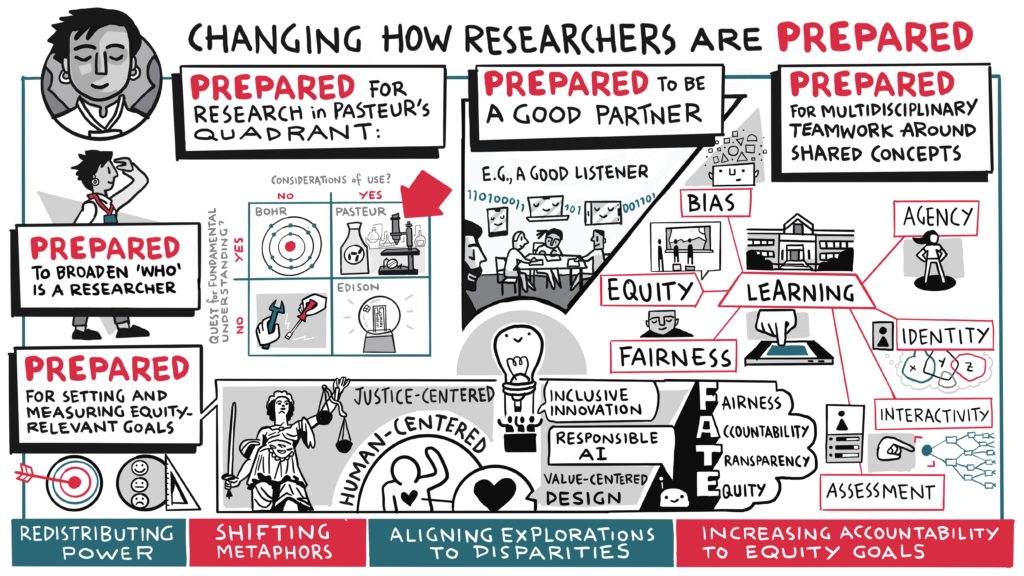
CIRCLS’21 participants recommended changing how researchers are prepared. Researchers should be prepared for research that balances considerations of use and fundamental knowledge; prepared to be good partners; prepared for multidisciplinary teamwork; prepared to set and measure equity-relevant goals; and prepared to expand who is included as a researcher. See the image and narrative below for more information.

Selecting Research Opportunities in Pasteur’s Quadrant
The community is concerned that researchers may be inclined to select research problems or opportunities that value theoretical or technological novelty over the potential to make a positive difference in the real world. A revised definition of “innovative” would consider the possibility for highly valuable change in a large community of practice. To define problems to investigate that are “fundamental” in one’s discipline yet “powerful” in a community requires researchers to ask what the community’s most pressing questions are and listen.
Frameworks for Setting Goals, Assessing Learning, Evaluating Approaches
Calls to action use a variety of terms that include justice-centered, human-centered, responsible AI, fairness+accountability+transparency+equity (FATE), inclusive innovation, and value-sensitive design. Researchers need to grow in their ability to understand how to go from the broad call of action to the design of a specific exploratory research project, which includes not only the vision for the project but also how student or teacher learning would be assessed within it, and how the promise of the focal technology design can be evaluated. Although frameworks exist—e.g., value-sensitive design, conjecture mapping, culturally responsive evaluation—how to engage these frameworks while doing specific research is more aspirational than everyday practice.
Multidisciplinary Refinement of Key Equity Concepts
Participants recognized that within computer science and AI, concepts like bias, fairness, and transparency are still in their early stages. Although the scholarly discourse in education and in learning sciences on these topics may be somewhat longer standing, there is still a lot of room for growth in how learning scientists are trained to work with similar concepts such as bias, cultural responsiveness, and student voice inclusion—especially as these concepts are invoked while exploring new designs for learning technologies.
Preparing to Be a Good Partner
The community recognizes that partnering with others is challenging and many researchers are under-prepared. This includes the challenge for computer scientists of partnering with learning scientists (and vice versa) as well as challenges of partnering with communities that would use or be affected by new technologies. Foci for learning for researchers before they engage in partnerships could include communication practices, listening practices, understanding and mitigating power differences, and practices that develop empathy and cultural competence. Our community is responsible for developing the next generation of scholars and has the responsibility to make sure that the ethic of inclusion of diverse stakeholders in research and collaboration with peers and practitioners is clearly communicated and expected in dissertation research, valued in job applications, and used in early-career evaluations.
Next page: Changing the Design Focus
